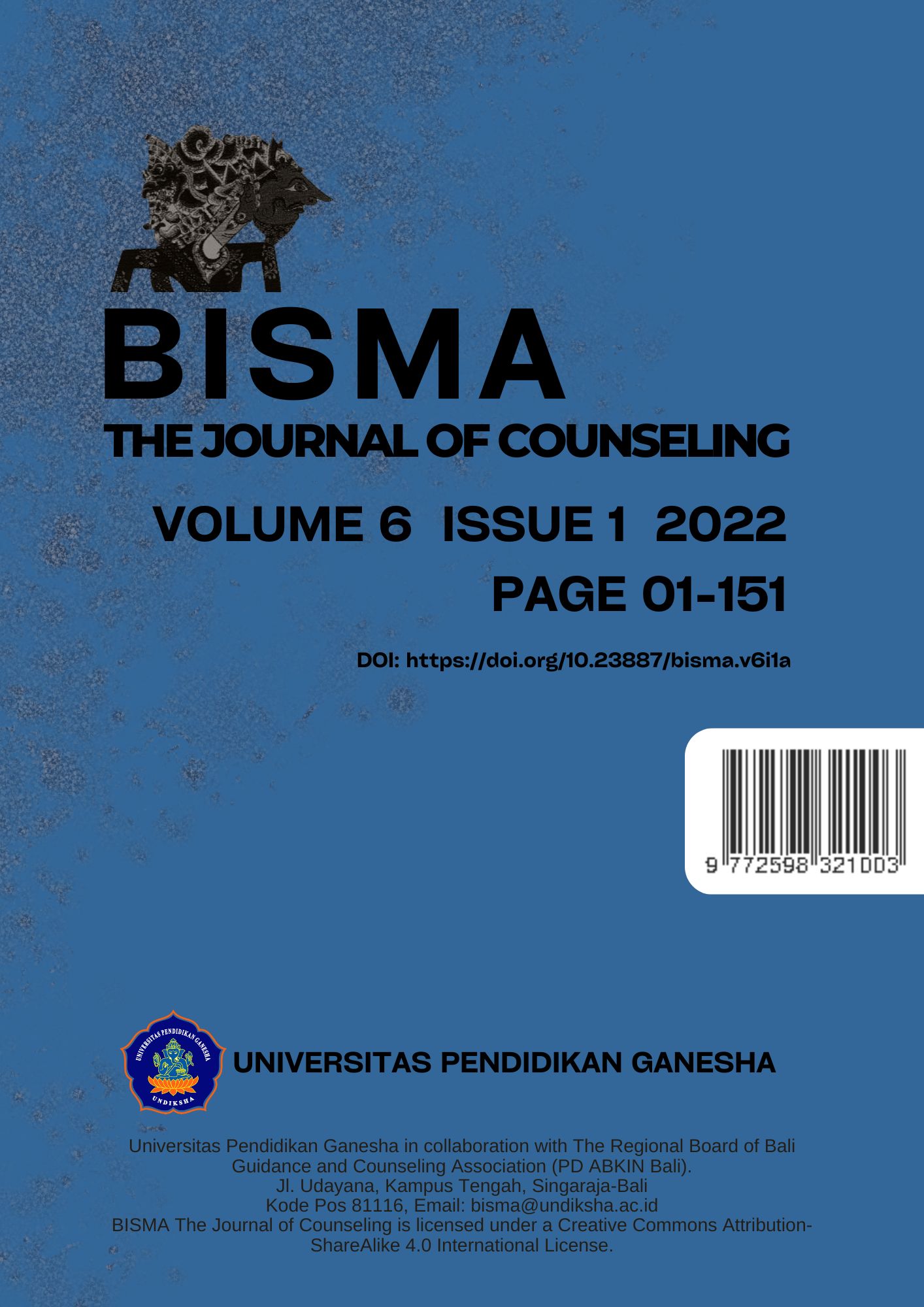The Saturation of Learning Online during a Pandemic
DOI:
https://doi.org/10.23887/bisma.v6i1.44015Keywords:
learning, online, pandemicAbstract
This research was motivated by many students who experienced boredom during online learning that occurred in Indonesia, including at SMP Negeri 39 Semarang. The purpose of this study was to determine the learning process during the pandemic, the obstacles and causes of students experiencing boredom in online learning in class VIII A and VIII I of SMP Negeri 39 Semarang. This study uses a qualitative method with a descriptive phenomenological research approach. Sources of data in this study are interviews, observation and documentation. The informants in this study were 4 students as primary and 2 teachers as objects. The data analysis technique uses an interactive analysis model. The results of this study indicate that class VIII A and VIII I SMP Negeri 39 Semarang experience online learning boredom during the pandemic due to various causal factors shown by students, one of which is the learning method that does not vary, learning is monotonous and many school assignments. Based on this, it can be suggested that the implementation of the online learning process should use varied learning methods so that students do not feel bored while studying and can arouse students' enthusiasm in participating in online learning.
References
Adedoyin, O. B., & Soykan, E. (2020). Covid-19 pandemic and online learning: the challenges and opportunities. Interactive learning environments, 1-13.
Anggrayni, E., Purnama, D. S., & Nurjanah, A. S. (2022, April). Learning Saturation Online in Students Based on School Burnout Inventory (SBI). In International Seminar on Innovative and Creative Guidance and Counseling Service (ICGCS 2021) (pp. 73-79). Atlantis Press.
Apriyanti, C. (2020). The parents role in guiding distance learning and the obstacle during covid-19 outbreak. Jurnal Ilmiah Pendidikan Dasar, 7(02).
Arifa, F. N. (2020). Tantangan Pelakanaan Kebijakan Belajar Dari Rumah Dalam Masa Darurat Covid-19. Jurnal Badan Keahlian DPR RI. Info Singkat-XII-7-I-P3DI-April-2020-1953.pdf
Batubara, B. M. (2021). The Problems of the World of Education in the Middle of the Covid-19 Pandemic. Budapest International Research and Critics Institute (BIRCI-Journal): Humanities and Social Sciences, 4(1), 450-457.
Bianchi, R. (2020). Do burnout and depressive symptoms form a single syndrome? Confirmatory factor analysis and exploratory structural equation modeling bifactor analysis. Journal of Psychosomatic Research, 131, 109954.
Camacho-Zuñiga, C., Pego, L., Escamilla, J., & Hosseini, S. (2021). The impact of the COVID-19 pandemic on students’ feelings at high school, undergraduate, and postgraduate levels. Heliyon, 7(3), e06465.
Derakhshan, A., Kruk, M., Mehdizadeh, M., & Pawlak, M. (2021). Boredom in online classes in the Iranian EFL context: sources and solutions. System, 101, 102556.
Efriana, L. (2021). Problems of online learning during COVID-19 pandemic in EFL classroom and the solution. JELITA, 38-47.
Irawan, A. W., Dwisona, D., & Lestari, M. (2020). Psychological impacts of students on online learning during the pandemic COVID-19. KONSELI: Jurnal Bimbingan dan Konseling (E-Journal), 7(1), 53-60.
Kadir, S., Astaman, & Masdul, M. R. (2018). Upaya Mengatasi Kejenuhan Belajar. Jurnal Kolaborasi Sain Universitas Muhammadiyah Palu.
Kahija, YF. LA. (2017) Penelitian Fenomenologis. Jalan Memahami Pengalaman Hidup. PT Kanisius: Yogyakarta
Kim, J. (2020). Learning and teaching online during Covid-19: Experiences of student teachers in an early childhood education practicum. International Journal of Early Childhood, 52(2), 145-158.
Literat, I. (2021). “Teachers act like we’re robots”: TikTok as a window into youth experiences of online learning during COVID-19. AERA open, 7, 2332858421995537.
Mahyoob, M. (2020). Challenges of e-Learning during the COVID-19 Pandemic Experienced by EFL Learners. Arab World English Journal (AWEJ), 11(4).
Mamurov, B., Mamanazarov, A., Abdullaev, K., Davronov, I., Davronov, N., & Kobiljonov, K. (2020, March). Acmeological Approach to the Formation of Healthy Lifestyle Among University Students. In III International Scientific Congress Society of Ambient Intelligence 2020 (ISC-SAI 2020) (pp. 347-353). Atlantis Press.
Moleong. (2013). Metodelogi Penelitian Kualitatif. Bandung: PT Remaja Rosdakarya
Muyor-Rodríguez, J., Fuentes-Gutiérrez, V., De la Fuente-Robles, Y. M., & Amezcua-Aguilar, T. (2021). Inclusive University Education in Bolivia: The Actors and Their Discourses. Sustainability, 13(19), 10818.
Ningsih, K. L. (2020) Kejenuhan Belajar Masa Pandemi Covid-19 Siswa SMTA Di Kedungwungu Indramayu. Jurnal Pendidikan Akutansi Universitas Muhammadiyah Surakarta. http://eprints.ums.ac.id/87028/10/naspub%20edit.pdf
Robiatul Adawiyah, A.R. (2013). Kecerdasan Emosional Dukungan Sosial dan Kecenderungan Burnout. Jurnal Psikologi Indonesia. Volume 2 (2), 99-107.
Suryaman, M., Cahyono, Y., Muliansyah, D., Bustani, O., Suryani, P., Fahlevi, M., & Munthe, A. P. (2020). COVID-19 pandemic and home online learning system: Does it affect the quality of pharmacy school learning. Systematic Reviews in Pharmacy, 11(8), 524-530.
Syam, R. Z. A., & Achmad, W. (2022). Online Learning in Higher Education: Analysis during the Pandemic Covid-19. Jurnal Mantik, 5(4), 2256-2261.
Vennix, J., den Brok, P., & Taconis, R. (2018). Do outreach activities in secondary STEM education motivate students and improve their attitudes towards STEM?. International Journal of Science Education, 40(11), 1263-1283.
Vitasari, Ita. (2013) Kejenuhan (Burnout) Belajar Ditijau Dari Tingkat Kesepian Dan Kontrol Diri Pada Siswa Kelaas XI SMA Negeri 9 Yogyakarta. Journal Of Chemical Information And Modeling. Volume 53( (9).
Downloads
Published
Issue
Section
License
Copyright (c) 2022 Sarah Nabila

This work is licensed under a Creative Commons Attribution 4.0 International License.








